Can Mold in a Basement Affect Upstairs Rooms?
Author: Omar Alonso | Editor: Omar Alonso
Review & Research: Jen Worst & Chris Miller
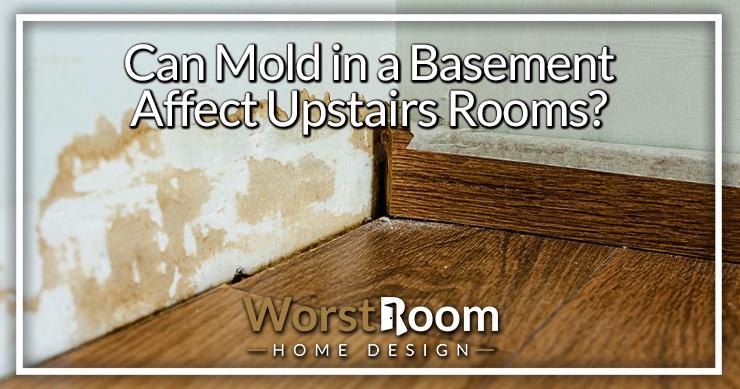
Do you have mold growing in your basement? Get rid of it now before it causes huge health problems in your household. Can mold in a basement affect upstairs rooms in the home? Yes, it can, and you must take care of this issue as quickly as possible. You can remove a small infestation by yourself or call a professional service to eradicate a larger infestation presenting a severe health risk.
Many species of mold are "pathogenic," meaning they cause infection and complications in the respiratory and cardiovascular systems. The spores flare allergies and create issues like sinusitis if they get into the air in your home
Basements are usually dark and sometimes damp, providing the ideal breeding ground for mold spores. They can get out of control fast, spreading into the HVAC system where they enter the air in upstairs rooms. This guide gives you everything you need to know about the health risk mold presents to you and your family and why you must remove it ASAP.
Can Mold in Basement Affect Upstairs Rooms in the Home?
Mold spores are light and microscopic. Some species of mold can hang in the air for hours, floating into other rooms in the home on natural air currents circulating through rooms. Most homes, even those without HVAC systems, have some level of ducting running through the walls. Mold spores can enter these ducts and move into other rooms upstairs, where they enter the air column.
Mold usually grows on surfaces like wood and drywall, and it also infests clothing left lying around in the basement or old furniture you store in the area. It's generally hard for mold to grow in dry rooms. However, if the relative humidity in the basement increases above 55%, mold spores have everything they need to start spreading in the space.
"Will mold in the basement spread into my home?" Well, since a finished basement counts as a story, it may already be in your "home" and categorizing it in your mind as if it isn't won't help you at all.
Can I Live in a Home that Has a Mold Infestation? What are the Risks?
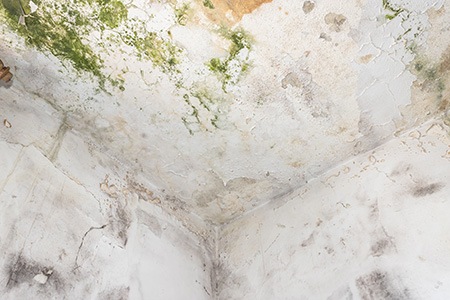
No. You can't live in a home with mold spores floating around in the air. The lightweight spores enter the air column and float, suspending in the air for hours at a time. You'll breathe them in where they enter your lungs, causing respiratory issues.
If people in the house have asthma or allergies, the mold spores can create adverse reactions resulting in allergies floating up, increased issues of sinusitis, the development of rashes, and asthma attacks in sensitive individuals.
Some species of mold are more pathogenic than others. Black mold is a fairly common species found growing in basements and bathrooms – it's also highly pathogenic. You could become very sick if you have a severe black mold infestation in your basement that spreads to the upstairs rooms. One place to routinely look for black mold is in your toilet.
Mold spores can float through rooms, landing in the back of closets and cupboards where they grow and spread. You'll notice the mold spores become out of control when the room smells musty. If that's the case, look for the mold right away. You'll probably find it growing in the dark, concealed areas of rooms.
If you find the mold, strap on a respirator mask, like an N95, and remove it immediately. The spores can't penetrate the N95 mask, protecting you from breathing them in. If you notice any signs of illness, seek medical attention immediately and tell your doctor about the mold.
They'll prescribe anti-fungal medications to treat your health issues. If you leave the mold and don't receive treatment, there's a chance it could start causing problems with your nervous system. You might end up developing seizures in advanced cases.
How Do Homeowners Stop Mold Spreading from the Basement?
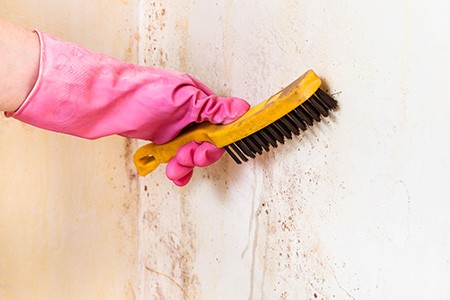
Can mold in a basement affect upstairs rooms? Yes, so stopping it from spreading is incredibly important. Killing and removing the mold from your home is the only way to stop it from spreading. You can remove a small infestation by yourself using DIY methods. However, larger infestations covering several sites in the basement require professional removal.
You'll need the right protective gear if you decide to do it yourself. We recommend using an N95 respirator to protect your respiratory tract and lungs from spores. You'll also need sealed goggles to prevent the spores from getting in your eyes, where they'll cause redness and irritation. Wear rubber gloves to stop the spores from getting on your skin, where they'll inflame epidermal cells and cause a rash.
Mold spores are microscopic, so you won't be able to see them in the air around you while working. You might sometimes see them floating in the air in a light column, and they'll look like dust particles. Any mold and mildew in your basement must be taken care of and soon.
After removing the mold, you'll need to remediate the air. Runa dehumidifier to bring the relative humidity down to a safe level of 55%. The dehumidifier will also remove the spores from the air, returning the basement to a safe state.
Will Mold in the Basement Go Away by Itself?
No. Mold won't go away by itself without a change in environmental conditions. They'll keep spreading as long as the spores have a surface to grow on and humid conditions allow them to breed. Eventually, they become airborne and enter air ducts or the HVAC system, spreading to upstairs rooms.
So can a damp basement affect the upstairs area? Yes. Removing the mold is step one. Controlling the environment of a damp basement area is your second step that will stop the first from reoccurring. You'll be especially susceptible to mold in an unfinished basement.
Mold spores are highly aggressive and challenging to kill. Simple methods like dish soap and running a humidifier without clearing the room won't do much to stop an infestation, especially if it's large. You'll need to address the problem fast to prevent it from spreading.
FAQ’s Regarding Mold in a Basement
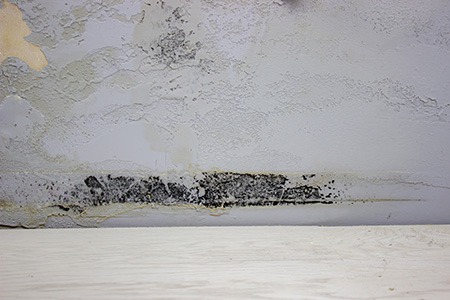
Obviously you’ve discovered mold in your basement and want to know how it affects the upstairs portion of your home. That’s a good concern, but the better one is getting that problem taken care of and evading any issues it might cause you. Let’s look at some questions surrounding these issues now.
Is Living in a House With a Moldy Basement Okay?
No. It's not a good idea to live in a moldy home. Can mold in a basement affect upstairs rooms? Yes, and if the basement has a mold infestation and it spreads to upstairs rooms, it leads to mold sickness in occupants.
This sickness starts with respiratory issues, allergy problems, and red, itchy eyes or skin rashes. Eventually, as the mold spores reach critical levels in the air, the person starts to develop the signs of severe mold sickness and may require hospitalization to recover.
What Can I Use to Kill Basement Mold?
We recommend using bleach to kill mold spores. Using items like vinegar and dish soap won't kill the spores, and they'll survive the treatment. Don't mix vinegar and bleach, as the combination causes the production of chlorine gas, which is a lethal toxin.
How Long Does it Take Mold Exposure to Make You Sick?
The symptoms of mold exposure usually appear two to nine hours after spore exposure. Immuno-compromised individuals will feel the onset of mold sickness faster than those with a healthy immune system. Typically, mold sickness can last for one to three days, provided the patient doesn't have repeated exposure to the spores.
What's the Best Way to Dry a Humid, Wet, Moldy Basement?
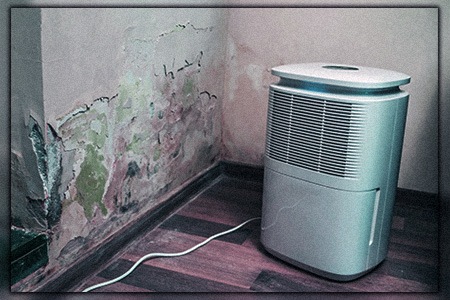
Dry a basement using a dehumidifier. Run it for 12 hours daily to remediate the air after removing the mold infestation. Don't worry about the disadvantages of a dehumidifier at this point. Those aren't remotely as serious as mold growth.
Can Severe Mold Infestations Collapse My House?
Mold likes to breed on wood. If a severe mold infestation occurs on the basement frame, it will rot the wood, leading to a possible collapse of the foundational structure.
Will Mold Grow in Concrete Basements?
Concrete has poor insulating properties, becoming a cold surface in the winter. If it gets wet, the basement is humid, and there is poor ventilation, it provides the ideal conditions for mold to grow and spread. Mold can grow in any types of basements.
Is Dry Mold Dangerous to Your Health?
Mold spores become inactive when the infestation dries out. However, if moisture enters the area and humidity increases, they can become active again. While dry mold is less of a concern than active mold infestations, breathing in the dry spores can still cause health issues and make you sick.
What is the Most Dangerous Type of Mold?
Of all the basement mold types, black mold (Stachybotrys) is the most toxic and highly pathogenic mold. Prolonged exposure to its spores can make you very sick. It's commonly found in basements and bathrooms in the home and requires immediate removal after spotting it. If you notice any mold sickness signs, consult your doctor immediately.
Key Takeaways Regarding Mold in the Basement & Upstairs Rooms
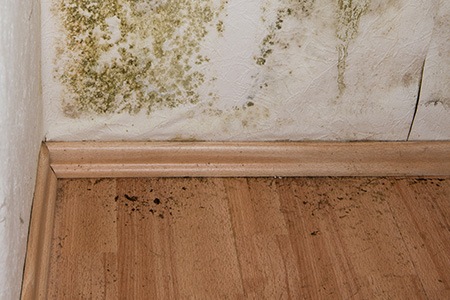
Let’s summarize and recap what we’ve learned above:
- Mold likes growing in dark and damp conditions, making the basement a prime area of the home for infestations to occur.
- Most species of mold are pathogenic, and they cause illness in people, especially immuno-compromised individuals.
- Signs of mold sickness include respiratory tract infections, lung infections, cardiovascular complications, allergic reactions, rashes, and sore, itching red eyes. In some cases, advanced mold sickness can lead to seizures.
- Small mold infestations are suitable for DIY removals, but you'll need professionals to handle severe infestations covering several areas in the basement.
- Remove the mold ASAP. If you're doing a self-removal, use the right PPE like respirator masks, goggles, and gloves.
- Use two cups of bleach and four cups of water for DIY removals. Scrub the mold away.
- Run a dehumidifier in the basement for 12 hours a day to remediate the air after removing the mold.
- Stop the water source entering the basement to ensure you don't return it to a humid environment.
No matter what your other concerns are, you need to be putting an action plan together to take care of this mold problem, which can include hiring professionals to come out and take care of it for you.
So, Can Mold in a Basement Affect Upstairs Rooms?
Can mold in a basement affect upstairs rooms? Yes, mold growth can propagate up and through the floor, and mold spores can be sucked up through your air conditioning intake and be spread throughout the home. Don’t risk it because not only will the problem become larger and more time consuming and expensive to deal with, but you can suffer health effects. Consult a local professional if you need help.



